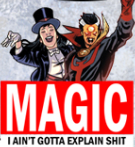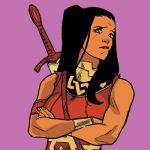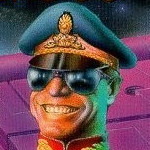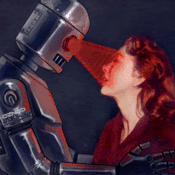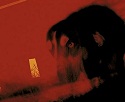|
EVGA Longoria posted:Sanderson is one of my favorite authors to read, because it's easy and enjoyable. I turn my brain off and enjoy reading about cool magics and simple intrigue. Yep, I like Sanderson. The Sanderson Avalanche at the climax is great fun and his endings are typically satisfying (yes, I know he does the endings first and then writes with the goal of reaching that ending). Plus, I'm vastly amused that he can board an international flight, and when he disembarks he's all, "Guys, I just had another book idea and banged out the 1st draft on the flight"
|
|
|
|

|
| # ? May 22, 2024 13:36 |
|
coyo7e posted:I stumbled across the new Sanderson joint, Perfect World. It's pretty good. It is a short story though, just FYI, so don't expect something long. flosofl posted:Yep, I like Sanderson. The Sanderson Avalanche at the climax is great fun and his endings are typically satisfying (yes, I know he does the endings first and then writes with the goal of reaching that ending). Plus, I'm vastly amused that he can board an international flight, and when he disembarks he's all, "Guys, I just had another book idea and banged out the 1st draft on the flight" Brandon Sanderson, the only author I've come across who can accidentally add a book to his trilogy of trilogies, accidentally have it turn into a quadrilogy in the middle of the trilogy of trilogies, and still show every impression of delivering all 13 books.
|
|
|
|
I finished Baru Cormorant. A gripe I have is similar to someone's opinion from many pages back. I also thought the story would span her entire life, and that everything in Ardwen (also I did the audiobook, so I'll probably spell all the names wrong) would be something like 20% of the book. I don't know what led me to think this, nor do I know why I assumed it, but it's probably because the book started out in her early childhood, then progressed through some years to her first assignment. I obviously realized--after Baru was in Ardwen forever--that the book would solely take place there, but it kind of threw the pacing off for me. Again, I realize 100% why the book had to start in her childhood, nor do I know why I made this assumption, but it threw me off nonetheless. Through the thickest knots of Baru's plan, I at times just lost track of which Duke was which and why x thing would work. A decent amount of words was given to what made each Duchy unique, but they felt like territories in a strategy game more than real places: one place gave wheat, one gave wood, one had fresh water, etc. From the perspective of Baru, this made sense, and I don't know that it's something I would have shifted focus for just to flesh out the duchies, but it did make it harder for me to mentally keep the dukes and duchies separate and distinct. Otherwise the book was really good. I've read quite a few fantasy novels this year, and this was the one with the most satisfying payoff. It was pretty refreshing to read a book with just one POV as well.
|
|
|
|
thespaceinvader posted:Brandon Sanderson, the only author I've come across who can accidentally add a book to his trilogy of trilogies, accidentally have it turn into a quadrilogy in the middle of the trilogy of trilogies, and still show every impression of delivering all 13 books. I know! He released that specific book 2011, then released a lot of other books, and the second book of that accidental trilogy hits the shelves in a week, with the third book coming out next year. He has an amazing work ethic. And I don't care what anybody else says, his books are mostly good or very good (except much of Elantris, sadly), and his writing is deeper than people give him credit for.
|
|
|
|
Just finished the Southern Reach Trilogy today and feeling very let down. Ending was pretty much non existent, would not recommend.
|
|
|
|
Torrannor posted:I know! He released that specific book 2011, then released a lot of other books, and the second book of that accidental trilogy hits the shelves in a week, with the third book coming out next year. He has an amazing work ethic. And I don't care what anybody else says, his books are mostly good or very good (except much of Elantris, sadly), and his writing is deeper than people give him credit for. Just wish the next Stormlight book was out because while I'm sure Kaladin will find reasons to be a dumb mopey kid yet again, I want to see the fallout of Adolin's problem-solving methods.
|
|
|
|
angel opportunity posted:I finished Baru Cormorant. I thought that was deliberate, since Baru's biggest flaw is that she sees everything and everyone as game piece instead of a player, a mistake she made several times throughout the book - see her referring to her coloured popularity map that basically is the overview map of every strategy game. So Aurdwynn being described as game board (by her) and the dukes more or less as NPCs conveyed that very well for me. It probably also made her betrayal of all of them and Aurdwynn itself a lot easier for her, distancing herself from the people she lived and worked (and loved) with for months and years. Decius fucked around with this message at 06:41 on Sep 29, 2015 |
|
|
|
Hedrigall posted:Crossposting from the "What did you just finish?" thread because most of the Aurora discussion was here: This is from a few pages back but I also just finished this and liked it a lot. Ship was the best character Robinson has ever written - I was actually so proud of it when it made its own decisions and stopped the fighting by declaring itself "the rule of law" and "the sheriff." And its final monologue as it flies past the sun, talking about how it had discovered its purpose and got its people home and how it was "a pleasure to serve," was one of the most affecting passages I've read in scifi for a long time. It's also a very surprising book in the way that Robinson basically repudiates everything else he's ever written, and really, the whole long history of science fiction and the unquestioned mantra that it's humanity's destination to move out into the stars. I don't agree with it at all, but it was a fascinating book and a very timely book in the age of climate change and trashing the planet.
|
|
|
|
MrSmokes posted:This book was really awesome and contained the exact kind of mystery and exploration of alien remnants that I was looking for. I finished it in one sitting because I liked it so much, this book seriously nailed it. I'm going to check out some more books that were suggested, but if anyone else knows of any books that are like this, I'd love to check them out. Iain Banks - Excession RIchard Morgan - Broken Angels Simmons - Hyperion Michael Crichton - Sphere also involved a creepy alien artifact, but it may be terrible. It's been a long time. Google suggests, but I haven't read or can't recall: Silverberg's Across a Billion Years Hogan - Inherit the Stars McDevitt - Engines of God
|
|
|
|
freebooter posted:This is from a few pages back but I also just finished this and liked it a lot. Ship was the best character Robinson has ever written - I was actually so proud of it when it made its own decisions and stopped the fighting by declaring itself "the rule of law" and "the sheriff." And its final monologue as it flies past the sun, talking about how it had discovered its purpose and got its people home and how it was "a pleasure to serve," was one of the most affecting passages I've read in scifi for a long time. I dunno, Maya and Sax are up there.
|
|
|
freebooter posted:It's also a very surprising book in the way that Robinson basically repudiates everything else he's ever written, and really, the whole long history of science fiction and the unquestioned mantra that it's humanity's destination to move out into the stars. I don't agree with it at all, but it was a fascinating book and a very timely book in the age of climate change and trashing the planet. But that's always been his take? Several other books of his feature minor characters leaving (or preparing to) on interstellar ships, and in most cases it's portrayed as an inherently flawed idea, or at least it's championed or undertaken by flawed and arrogant characters. In his words, "the story says goodbye to them." He's always felt that the solar system is "humanity's backyard - interesting and accessible," but that the stars are too far.
|
|
|
|
|
Starkk posted:Just finished the Southern Reach Trilogy today and feeling very let down. Ending was pretty much non existent, would not recommend. I mentioned last page how I really enjoyed it, but I think that's a fair point, and it's definitely not for everyone. Not specific spoilers but spoilers for the general feel and arc of the series: there's A LOT left unanswered and open to interpretation. Even the biggest mystery from the first book isn't really wrapped up in any way that makes definite sense or has any "payoff". I enjoyed it for this reason because it's clear that none of the characters have any clue what's going on either and even if they did it wouldn't make any sense to them, nor the reader. And the prose is just pretty darn good, Area X really comes alive and feels like a real place that's just slightly "wrong" from our world. I am definitely going to re-read it sometime soon because it's possible that there are more answers than there seem to be, they're just not immediately spelled out.
|
|
|
|
thehomemaster posted:I dunno, Maya and Sax are up there. Mmm of the Mars trilogy I thought the best characters were Frank, John and Arkady - which is why it was disappointing that none of them survive the first book, although I can also see how that might have been a deliberate move to knock off the more traditionally "active" male hero figures. Of those remaining I thought Anne was the best (a good case study in characters you respect even if you don't actually necessarily like them) although Sax did quite grow on me. Anyway I just really loved Ship  Prolonged Priapism posted:But that's always been his take? Several other books of his feature minor characters leaving (or preparing to) on interstellar ships, and in most cases it's portrayed as an inherently flawed idea, or at least it's championed or undertaken by flawed and arrogant characters. In his words, "the story says goodbye to them." He's always felt that the solar system is "humanity's backyard - interesting and accessible," but that the stars are too far. I don't remember the interstellar ship in the Mars trilogy being painted in negative terms (although it's been a while since I've read it) and I don't remember one at all in 2312 (which I read when it came out), although I'll take your word for it. But I doubt it was quite as comprehensively damning as the conclusion he comes to at the end of Aurora. Even here, he seems to be saying that the settlement of the solar system should only be used to shore up and support life on Earth, rather than for its own beautiful, diverse sake. Aurora has its thumb pressed fairly heavily on the scale to make us reconsider and appreciate our existence on Earth. Which again, is good and interesting and a take I appreciated even if I don't agree with some of the conclusions it draws. Without playing armchair psych I'd say that Robinson getting older has something to do with it, as of course does the fact that climate change and the trashing of the Earth is a far heavier political issue now than it was in the 1990s.
|
|
|
|
thehomemaster posted:I dunno, Maya and Sax are up there. Nadia and Sax were the best female and male characters in the books, with Nadia edging out Saxifrage as the best overall character.
|
|
|
|
Thanks for the recommendations, especially "A Mosque Among the Stars". I'm actually about a third of the way into Red Mars and had forgotten that there were Muslims in it at all (from the flash-forward prologue); I'm interested in seeing if they address the pilgrimage in there, like if Martian-born Muslims just end up taking a couple of years on a trip to Earth as a regular part of life. I don't think it's brought up in Hyperion (only read the first two, at the advice of this thread), but with the farcasters it would be like visiting just about any other place. As long as your planet is hooked into the network, it's just regular travel costs.
|
|
|
|
Just to remind me, what books have there been on this thread where multiple people have made huge, spoiler-tagged posts talking about them? I remember Baru Cormorant, The Dark Forest, and Blindsight. Did I miss any? I want to read them all eventually.
|
|
|
|
Beef Hardcheese posted:Thanks for the recommendations, especially "A Mosque Among the Stars". I'm actually about a third of the way into Red Mars and had forgotten that there were Muslims in it at all (from the flash-forward prologue); I'm interested in seeing if they address the pilgrimage in there, like if Martian-born Muslims just end up taking a couple of years on a trip to Earth as a regular part of life. I don't think it's brought up in Hyperion (only read the first two, at the advice of this thread), but with the farcasters it would be like visiting just about any other place. As long as your planet is hooked into the network, it's just regular travel costs. Isn't Earth gone in the Hyperion books? It's been ages (and I only read the first two) but I seem to remember it being uninhabitable/blown up/cut off from the farcaster network or something like that.
|
|
|
|
ToxicFrog posted:Isn't Earth gone in the Hyperion books? It's been ages (and I only read the first two) but I seem to remember it being uninhabitable/blown up/cut off from the farcaster network or something like that. You're right... I'd totally forgotten about that. There was the whole black hole but not a black hole, and tied into that whole Ultimate Intelligence Technocore Whatever backstory stuff.
|
|
|
ToxicFrog posted:Isn't Earth gone in the Hyperion books? It's been ages (and I only read the first two) but I seem to remember it being uninhabitable/blown up/cut off from the farcaster network or something like that. Yeah, some sort of experimental wormhole ate it, a shielded moon still circles it. And I think there was a duplicate museum Earth somewhere later in the increasingly dumb series.
|
|
|
|
|
Beef Hardcheese posted:Thanks for the recommendations, especially "A Mosque Among the Stars". I'm actually about a third of the way into Red Mars and had forgotten that there were Muslims in it at all (from the flash-forward prologue); I'm interested in seeing if they address the pilgrimage in there, like if Martian-born Muslims just end up taking a couple of years on a trip to Earth as a regular part of life. I don't think it's brought up in Hyperion (only read the first two, at the advice of this thread), but with the farcasters it would be like visiting just about any other place. As long as your planet is hooked into the network, it's just regular travel costs. In Red Mars (I didn't read Green or Blue Mars) the Muslims on Mars had all come recently (like within a few years), so all of them were Earth born, and they hadn't mentioned any children born on Mars, or what their children would have to do. It was pretty heavily implied though that if you were born on Mars you could probably never go to Earth due to the gravity differences. Even Earth people who wanted to go back had to work out for like 3 hours per day, and if they stopped working out that heavily, they could "never go back."
|
|
|
|
Solitair posted:Just to remind me, what books have there been on this thread where multiple people have made huge, spoiler-tagged posts talking about them? I remember Baru Cormorant, The Dark Forest, and Blindsight. Did I miss any? I want to read them all eventually. That list is basically notable science fiction from the past year or so. You should definitely add Aurora to the list, and be aware that The Dark Forest is the second book in a trilogy, with the first being The Three Body Problem. e: repetitive repetition Clark Nova fucked around with this message at 18:39 on Sep 30, 2015 |
|
|
|
ToxicFrog posted:Isn't Earth gone in the Hyperion books? It's been ages (and I only read the first two) but I seem to remember it being uninhabitable/blown up/cut off from the farcaster network or something like that. And this did have religious implications, as I remember – it caused a crisis of faith within Judaism, because God appeared to have broken the Noahic Covenant.
|
|
|
|
Man I really did not like the mission log format of The Martian and having only one character in the book removed any sense that he wasn't going to survive during any of the dangerous stuff he went through. Oh no something bad happened, but there's still a hundred pages left in the book, I wonder if he makes it through? Also a bunch of people recommended the Red Rising books and while I wouldn't call it bad, I'm tired of books taking the same themes of Harry Potter and Hunger Games. I get they are popular so people are going to copy good ideas from them, I'm just tired of that kind of story in general. I liked the second book a lot more! Doorknob Slobber fucked around with this message at 01:19 on Oct 1, 2015 |
|
|
|
Reason posted:Man I really did not like the mission log format of The Martian and having only one character in the book removed any sense that he wasn't going to survive during any of the dangerous stuff he went through. Oh no something bad happened, but there's still a hundred pages left in the book, I wonder if he makes it through? They could have finished it in third person by using NASA reports, logs, and Press releases. Or just using a 3p narrative.
|
|
|
|
I just finished Baru Cormorant. Jesus Christ those last few chapters put me through the wringer. I had an inkling the double-betrayal was coming for a while, but I didn't expect it to be so brutal. That is how you write dark fantasy, and all these grimdark motherfuckers who fill their books with 'edgy' rape scenes and wall-to-wall swearing should take note. Best fantasy novel I've read this year by a country mile.
|
|
|
freebooter posted:I don't remember the interstellar ship in the Mars trilogy being painted in negative terms (although it's been a while since I've read it) and I don't remember one at all in 2312 (which I read when it came out), although I'll take your word for it. But I doubt it was quite as comprehensively damning as the conclusion he comes to at the end of Aurora. In the Mars books it's it's not presented as negatively as I remember, the passage that describes it is more shocked and numb in tone - Jackie Boone is the one who leaves. She's an arrogant and power hungry person. The death of her daughter Zo really shakes her and she leaves on the starship in a sort of daze - defeated by the world, running away from the past with the ultimate physical gesture. It's not a hopeful or inspiring scene. She says the standard things - "there's nothing for me here," "I want a fresh start," "it will be an adventure" - but we see the scene from Nirgal's POV and the diolouge isn't even offset by quotes - it's written to be flat and confusing. Why is she doing this crazy thing? In Icehenge (1984) the beginning of the book has a character who decides to build and leave on a starship with a small crew. The protagonist of that section flatly tells them that their ecology isn't sufficiently closed and that they'll all die before they get anywhere. They leave anyway and are never seen or heard from again. In 2312 the starships are given their own little expository minichapter - Four are being built out of Pluto's moon Nix, and will travel at 2% lightspeed to a star about 40ly away - a 2,000 year trip. From that section: "Sorry, but it's true. It has to be said: the stars exist beyond human time, beyond human reach. We live in a little pearl of warmth surrounding out star; outside it lies a vastness beyond comprehension. The solar system is our one and only home." ... "So. Our little pearl of warmth, our spinning orrery of lives, our island, our beloved solar system, our hearth and home, tight and burnished in the warmth of the sun - and then - these starships we are making out of Nix. We will send them to the stars, they will be like dandelion seeds, floating away on a breeze. Very beautiful. We will never see them again." [end minichapter] At the end of the book the first completed starship is used as a prison ship for the guy who orchestrated the attacks on Terminator and Venus' sunshield, and the people and qubes who collaborated with him. They're loaded aboard, locked in, and shot out of the solar system forever. Not quite as damning as Aurora, but pretty close I think. freebooter posted:Even here, he seems to be saying that the settlement of the solar system should only be used to shore up and support life on Earth, rather than for its own beautiful, diverse sake. Aurora has its thumb pressed fairly heavily on the scale to make us reconsider and appreciate our existence on Earth. You're right about the extra hard thumb pressing in Aurora, but 2312 has broadly the same message, and was totally fine with celebrating the diversity and beauty of the colonized solar system. He's given interviews after writing Aurora, and he definitely still thinks it'd be exciting and cool to go live on Mars or Saturn's moons etc. He just thinks it's better to focus on the problems in front of us; it was never going to be us on Mars anyway, so what's the rush? freebooter posted:Which again, is good and interesting and a take I appreciated even if I don't agree with some of the conclusions it draws. Without playing armchair psych I'd say that Robinson getting older has something to do with it, as of course does the fact that climate change and the trashing of the Earth is a far heavier political issue now than it was in the 1990s. I think this is certianly a factor, but he's always been very environmentally conscious. Obviously the problem is worse now, and much more obvious, but he was writing about an environmentally conscious ecotopia (including severe limits on greenhouse emissions) in Pacific Edge, in 1990. The characters watch the first manned Mars landing on TV, in 2065. It's a pretty powerful scene, and the only mostly clean-conscious space travel I can recall in his writing. He's always acknowledged the problems on Earth, and most of his books are at least partly about addressing them. But he's also hopeful and excited about space travel. So he writes grounded stories where the costs of spaceflight or terraforming (environmental, psychological, moral, economic etc) aren't glossed over, and are sometimes brought to the fore. That hasn't changed.
|
|
|
|
|
Ah, I'd forgotten that part of 2312. Actually I've forgotten a lot of 2312 and I only read it a few years ago, I guess it didn't grab me like Aurora or the Mars trilogy did. (Is Icehenge any good? I read Memory of Whiteness years ago and found it to be much more of a light, fun flight of fancy than his other books.) I agree that he's always been a political writer and an eco-conscious writer, but whereas his other books reflected a huge array of interests and present a mixed bag of opinions and situations, I felt that Aurora was much more heavily geared towards presenting a single moral conclusion. I mean that in the best possible way; it's what science fiction is really "for," if it's for anything. It's a cautionary tale and a parable and it feels like pretty much every part of the book is working towards this greater whole. When I say it has its thumb pressed on the scale it sounds like a negative thing, I should have phrased it differently. I meant that it felt like he'd really pared away all his usual (if enjoyable) extraneous worldbuilding and was really just focusing on this straight moral narrative, and the book is really successful for it. Actually there was one bit which I thought was Robinson not being able to help indulging himself, the people who live as traditional Inuit and take their kids outside the spaceship as an initiation rite. So... haven't those kids now missed out on years of early mathematics and physics lessons, when everybody on the ship "has to be a scientist"? Anyway, as well as being a good book I think it's also a really important book and I expect it to take out a lot of awards next year. Prolonged Priapism posted:You're right about the extra hard thumb pressing in Aurora, but 2312 has broadly the same message, and was totally fine with celebrating the diversity and beauty of the colonized solar system. He's given interviews after writing Aurora, and he definitely still thinks it'd be exciting and cool to go live on Mars or Saturn's moons etc. He just thinks it's better to focus on the problems in front of us; it was never going to be us on Mars anyway, so what's the rush? Maybe it's just because I found Aurora to be the better-written and more cohesive novel (or maybe because 2312 presents the solar system as an exciting playground whereas Aurora laments the fate of people stuck in a prison ship) but it was Aurora which really changed my mind and made me respect the "problems on Earth first" mentality. I used to get so irritated by the inevitable comments underneath articles about NASA funding Mars missions or whatever, by the sort of people who think we can't ever fund a rocket if there's a single poor person anywhere in the world - or worse, the sort of people who think humanity is a disease that will just ruin other planets. (Like, if you think the universe would be better off without humanity... kill yourself I guess?) But something about Aurora clicked the timescale thing with me. I'm never going to see it, it's always just going to be in my imagination, so what's the big deal? What's so wrong with people who think that we should, in fact, focus on Earth first? Which is not to say that I think people should only ever focus on stuff that will affect their own limited lifespan - I mean, that's the sort of mentality that causes climate change denial. I still hope we see extensive colonisation and mining operations on Mars within my lifetime. But I think I'm more in line now with Robinson's idea that solar system colonisation is always going to be about nourishing and supporting Earth itself.
|
|
|
|
Megazver posted:I wonder how he'll manage to fit in a blow-by-blow magic battle scene into a dinner date.
|
|
|
|
freebooter posted:I'm never going to see it, it's always just going to be in my imagination, so what's the big deal? What's so wrong with people who think that we should, in fact, focus on Earth first? I think that is more-or-less what you're saying, and while you arrive at a good conclusion you're taking a bad route by focusing too much on yourself. It's better to look at it this way: what problems do we have on Earth are we looking to solve? What does expansion out into the solar system and stars actually accomplish for us, that can't be done in a more immediate and efficient fashion by focusing our creative and intellectual energy on the planet that birthed us? Tiny Timbs fucked around with this message at 03:07 on Oct 1, 2015 |
|
|
|
Along the lines of KSR's eco-conscience, he said the following in 2012, and it serves as one of the epigraphs to Naomi Klein's new book: “In my books I’ve imagined people salting the Gulf Stream, damming the glaciers sliding off the Greenland ice cap, pumping ocean water into the dry basins of the Sahara and Asia to create salt seas, pumping melted ice from Antarctica north to provide freshwater, genetically engineering bacteria to sequester more carbon in the roots of trees, raising Florida 30 feet to get it back above water, and (hardest of all) comprehensively changing capitalism.” Great quote, great writer, always hoping to see more and more from him.
|
|
|
|
|
mdemone posted:Along the lines of KSR's eco-conscience, he said the following in 2012, and it serves as one of the epigraphs to Naomi Klein's new book: lest you think he's not actually in favor of techno-loving planets Seriously though, KSR isn't a Greenpeace activist and he isn't a techno-fetishist. There's a lot of room for subtlety in how you can approach the caretaking of Earth vs expanding outward. I don't even really like much of his writing but I'm glad he's offering his perspective. Tiny Timbs fucked around with this message at 04:20 on Oct 1, 2015 |
|
|
|
PINING 4 PORKINS posted:I think that is more-or-less what you're saying, and while you arrive at a good conclusion you're taking a bad route by focusing too much on yourself. Oh, I'm not a total convert or anything - I still want to see a human civilisation of billions spread across the solar system at the very least, simply for its own sake. I just have a lot more time for the "earth first" perspective now.
|
|
|
|
I really need to hurry up and read everything he's written. Also The Traitor is really good two chapters in. Much better than Luna.
|
|
|
|
After reading everyone gush about The Traitor Baru Cormorant, I bought a copy just now(kindle version). I have a new script that's being deployed into production and I need to babysit it for a bit, so I imagine I'll be digging in shortly. I have to say, if I wasn't already persuaded by this thread, this snippet from a 5-star review would have done it by itself. Amazon Review posted:PS. Does anyone else absolutely adore the authors picture part of amazon? You know this guy is legit because he looks like the nerdy version of a Tapout shirt.
|
|
|
|
WizardFight™ Updates. Light spoilers throughout:Robotnik posted:
I've just finished the trilogy, and I have never been so disappointed in a series. Not because it's bad, it's actually pretty decent, but because it starts so strong, has such an absolutely fantastic premise, and then completely fails to deliver on all that potential, and instead serves up utterly generic fantasy schlock. The Powder Mages themselves are one of my favourite fantasy creations. The powers are simple and intuitive. There's no length explanations about how and why they can do what they do, and the magic system stays completely out of the way during the fight scenes. It's very readily apparent how much they can do and what their limitations are, so we can skip all the waffle about seizing Warrens and opening mana and channelling weaves, and get straight to punching bad guys and blowing stuff up. The fights are well-paced, frantic but never messy, and manages to work the powder mage abilities into actual combat, without pointless wizardy grandstanding. The few appearances traditional wizards make manage to be suitably brutal and nasty - these guys can vaporise armies with a wave of their hand, and the books do a great job of capturing that. The different mages each have nicely differentiated skill sets (Taniel the magic sniper, Tamas the human blunderbuss) that injects some variety into their scenes, without feeling like we've wandered into an episode of X-Men. What go my hopes up early on is how well the system ties in and supports the initial plot of the books - the powder mage coup against the King and his Priveleged. On one side there's the rich nobility, with their arcane and esoteric magics, fancy clothes, and implied Received Pronunciation accents. On the other, the violent and vibrant young soldiers, dragged out of the lower classes who throw themselves into drug-fuelled rages by snorting gunpowder every chance they get. That is absolutely fantastic to my mind. It's magic as metaphor. The conflict is about ideologies and social philosophies, not just bullets vs fireballs. Then, after the first few chapters, this nice neat magical contrast completely and utterly falls apart. McClellan adds more wizards, and semi-wizards, and mega-wizards. It feels like every other chapter adds a new guy to the pile - Knacked, Mage-Breakers, Wardens, Black Wardens, Predeii, Bone-Eyes, Gods, demigods, every fucker wants to get in on this action. There's no reason for half these people to exist, they barely add anything to the conflict. And the discussions of how Priveleged magic works manages to be both tediously drawn out and trivially simple, yet doesn't actually offer any understanding beyond the initial "they're loving wizards, they'll melt your head". Worse, the first time this explanation appears is in a conversation between two characters who have no reason at all to know this kind of stuff - it's clear that McClellan just wanted to show off his fancy-pants magic. Plotwise - nothing to write home about. The initial conflict - how to rebuild after a military coup, is dismissed most of the way through the first book, and never rears it's head again. McClellan throws away his one interesting concept in favour of more generically evil empires and ancient wizards doing nefarious deeds for poorly defined reasons. The whole thing is staggeringly over-plotted, with various PoVs (especially eidetic memory, totally-not-sherlock-holmes Detective Adamat) spending half their chapters flitting back and forth between the same tiny cast of characters, achieving very little. You could trim it down to two books if you cut out all the pointless toing and froing. Characters are largely walking stereotypes - the burned out policeman called back to duty, the mysterious and powerful savage, the soldier who can't follow orders and gosh-dammit he's just too good at his job to court-martial. The exception is Tamas. Good god Tamas. He thinks he's Samuel Vimes, but doesn't have a drop of self-awareness in his body. There's hints of his darker side, but McClellan never really commits to making him a properly flawed character.Which is a shame, because I would gladly have read another thousand pages of Book One Tamas: "The age of kings is over!" *installs self as de-facto ruler of the city* "Power resides in the people!" *sends in assassins to murder people without trial* "I will not become a tyrant!" *orders mass-executions* quote:Jim Butcher's Codex Alera. I've just finished the first book. The characters are a bit more interesting than Powder Mage, but nothing outstanding, and the plot similarly has lots of faffing about (get captured - escape - chase scene - fight -get captured again - escape, for three different PoVs, multiple times. It's like poetry, it rhymes). But Jim Butcher's writing is so very earnest that it's easy to forgive him when he slips into cliche. There's not a drop of irony anywhere, no sly nudges or cheeky winks. Will our rascally outsider protagonist make up for his physical and magically short-comings with wit and gumption? You betcha. Will he triumph through courage and friendship? drat straight. Will he learn to take responsibility and become a man, even it means slighting authority? Hell yes he will. This earnestness runs right through the magic system too. The actual concept of the setting - Romans with Pokemon - came about as the result of a bet, but like the characters, Butcher plays it absolutely straight. A showdown between our heroes and minor villains, in which they line up and dramatically hurl pokeballs to the ground should be laughable, but the prose absolutely commits to the seriousness of it, and I couldn't help getting caught up in the moment. The furycrafting system is more complex than the powder mages, but the action is never bogged down in explanations of how furies do stuff - it's just an ability that everyone in this world has, what matters is what they can do, not why. It reminds me a lot of The Last Airbender with how thoroughly it explores the limits of what you could do in a fight. Also Butcher has a strange obsession with feet. Not a fetish like Tarantino, but I feel that if you asked him, he'd tell you how all of military strategy can be reduced to how well you take care of your feet. Characters spend an inordinate amount of time bandaging their feet, stealing each others boots, using three kinds of magic to keep their feet warm. Someone needs to buy that man a decent pair of slippers. Hand Row posted:Malazan series. It starts out with a giant black magical dude standing on a floating moon giving the finger to an entire army and loving it up. I tried First Law, couldn't really get into it. The prose just felt really at odds with what was going on, and the opening fight annoyed me in how it refused to take itself seriously, despite all the blood and swearing. Also the scene in which we're introduced to three wood spirits, with not a single word used to actually describe the wood spirits. And I think if I slag off Malazan any more in this thread I'll make an enemy of the RSPCA. Jedit posted:Literally anything by Gemmell. Legend is next on my list. I loved Eddings as a teenager (especially for the scene in which the Dowser phases two men into a rock wall to die, and can't understand why everyone is horrified by this), but re-reading Redemption of Althalus I'm chocked at how simplistic and trite his prose is. Althalus is a thief. He goes around introducing himself as a thief, goes to thief bars, like it's a loving MMORPG. I also finally got round to reading Lies of Locke Lamora. Wizard fights are much like the rest of the book - by turns hilarious and harrowing.
|
|
|
|
I felt the same way about Powder Mage as you. So much potential, some unique concepts, and some good characters but the overall plot is weak and the writing is just okay and never improves. Sincerely hope to see the author to continue in the universe though, and bring some more depth.
|
|
|
|
coyo7e posted:Haven't you ever read a book on rules of etiquette? He'll be using 3rd-rank soup-spooning and rolling saving throws to not chew with his mouth open or spill on his shirt. You must recharge your palette with water between each bite of a different entree. Palate.
|
|
|
|
I think a lot about the Powder Mage books is explained by the author being a pupil of Sanderson's: intricate magic, worldbuilding, religion and general fluff - and paper-thin characters in a generic and bland plot; all marks of his writing.
anilEhilated fucked around with this message at 20:53 on Oct 1, 2015 |
|
|
|
|
In case anyone cares about Rothfuss.....
|
|
|
|

|
| # ? May 22, 2024 13:36 |
|
I'm personally excited for the video game sex fairy segment
|
|
|



